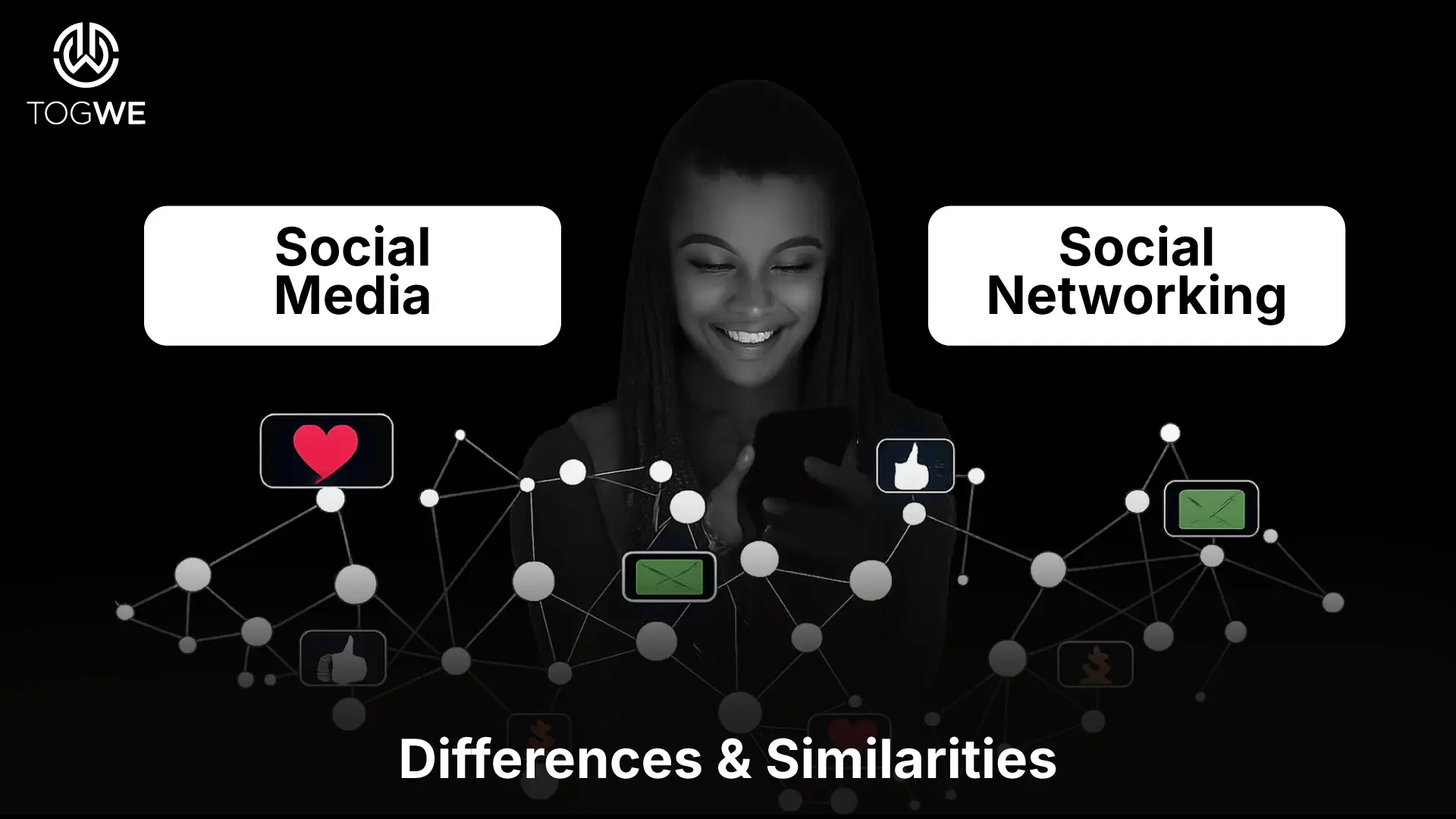From private conversations to business marketing, these technologies have transformed human connection into a global experience. This digital revolution has also given rise to two of the most confusing concepts: social media and social networking. These terms are often used interchangeably, but they are not the same. They each play a distinct yet complementary role in our digital lives and marketing ecosystems. Knowing the difference between them will help individuals and businesses make the most of their presence.
In this blog, we will explain to you what social media and social networking really are, explain how both can help your marketing strategies.
What Is Social Networking?
Social networking is defined as the process of maintaining personal and business relationships in the online world. It means exchanging data or words with family and friends, customers, or people with similar interests over the internet. In other words, social networking is the act of building relationships. It is not just about publishing content; it is about creating connections that will help in mutual growth. Some of the popular social networking sites include Facebook, LinkedIn, X, and Instagram. These sites allow two-way communication where users can chat directly and connect with each other.
Example in Action
For example, imagine a customer submitting a complaint to a company via Twitter. Without having to wait for a formal email, the company can respond immediately and even provide assistance – so much so that it can resolve the issue in real time. This type of direct interaction not only resolves issues but also builds trust and brand loyalty.
For Businesses
Marketers use social networking to:
- Build brand relationships with audiences.
- Engage customers through discussion and feedback.
- Build trust and loyalty.
- Provide customer service through real-time interaction.
- Basically, social networking is relationship-driven, rather than content-driven.
What Is Social Media?
Social media is a web-based platform that allows users to create, share, and consume digital content such as text and documents. It is primarily used for content dissemination. That is, the creation and publication of information by individuals, brands, or organizations so that a large audience can view and engage with them. Platforms like YouTube, TikTok, Instagram, Reddit, and Medium are great examples of social media tools. These provide a way for users to upload content and reach millions of people around the world.
Example in Action
A brand might upload an engaging video about a new product on Instagram. Sometimes, this number reaches into the thousands, extending the company’s reach beyond its direct followers. Some of the interaction takes the form of likes and comments, but here, the main activity is focused on creating content.
For Businesses
Businesses also use social media for:
- Promote products and services.
- Increase brand awareness.
- Reach larger audiences through viral content.
- Run digital advertising campaigns.
- Collect insights through engagement analytics.
In short, social media is centered on content, where information and stories are being spread to every audience.
Social Networking Vs Social Media: The Key Differences
While there is some overlap between the two, they maintain distinct characteristics that set each apart. Let’s break down the key differences between the two:
Aspect Social Media Social Networking
- Definition: Platforms of broadcasting content and information to audiences. Platforms of building and maintaining relationships and communities.
- Primary Focus: Creation, sharing, and promotion of content.
- Interaction/Communication, Relationship Building
- Nature of Communication: Mostly one-way or limited two-way interaction. It is a strong two-way or multi-directional conversations.
- Purpose Marketing, awareness, and information dissemination. Establishing connections for continuing relationships personally or professionally.
- Examples: YouTube, TikTok, Instagram, Reddit; Facebook, LinkedIn, X (Twitter), Discord.
- Objective To extend visibility and reach. To connect and engage directly with people.
Read More: Top 15 Apps Like Wizz Alternatives to Make New Friends in 2025
Understanding in a Simple Way
Think of it this way:
- Social media = “what” you share.
- Social networking = “Who” you share it with.
Media is the message! It’s all about photos, and text-whereas networking involves the relations built across that message.
The Marketing Perspective
Social media is perfect for promoting products, sharing news, and increasing website traffic. Social networking is ideal for connecting with customers and partners, which can strengthen your brand.
Social Networking vs. Social Media: The Similarities
Despite their differences, social networking and social media have many similarities:
Both are internet-based
They rely on digital technology to connect people and enable communication across borders. Neither can function effectively without the internet.
Both Enable Interaction
Whether it’s like a post, commenting on it, or replying to a message, both encourage interaction between individuals or organizations.
Both can go viral
A powerful idea, post, or campaign can go viral on social media, such as social networks – creating enormous engagement.
Both Support Marketing and Branding
Both are used by companies for brand awareness, audience engagement, and lead generation.
Both Evolve Constantly
New tools, algorithms, and features are constantly being added to make users more interested in other people’s content.
Why Understanding the Difference Matters?
Knowing the differences between social media and social networking can help you create a better marketing strategy.
For example:
- If your aim is to increase brand visibility, then focus more on social media marketing via Instagram, YouTube, or TikTok.
- If building professional relations is your aim, then invest in social networking via LinkedIn or Facebook groups.
- Knowing what each is used for will prevent the misapplication of resources. It will also help you reach targeted, measurable results.
Read Next: Top 13 App Ideas For Students That Will Inspire You (2025)
Final Thoughts
The line between social networking and social media is indeed thin. But in your communications and online marketing, it can make a huge difference. Use social media to talk to the world and use social networking to listen, connect, and build lasting relationships. When both strategies work in harmony, your digital presence becomes meaningful and impactful.





